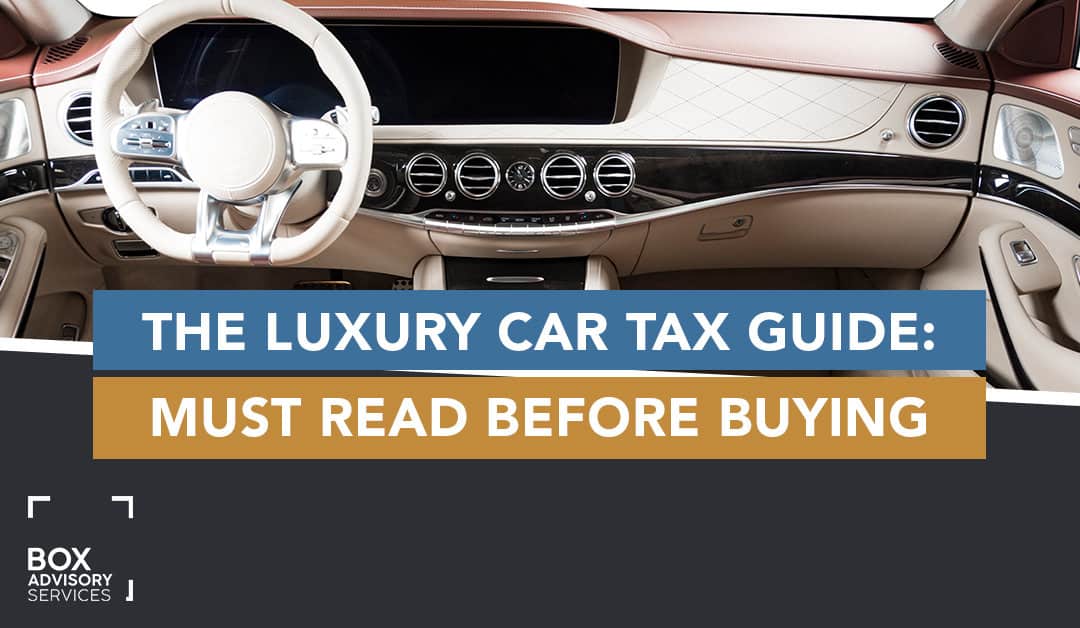
BY
|
The Luxury Car Tax Guide: Must Read Before Buying
If you’re thinking of buying that brand new Mercedes-Benz S-Class, you’ll need to also think about luxury car tax.
You might change your mind when you hear just how heavily luxury cars are taxed in Australia.
Either way, it’s good to know what tax consequences you’re going to be liable for when you drive that shiny new expensive car out of the dealership. Luxury car tax can add a significant amount to the price you pay for your car.
So, we create this guide to help you understand exactly what luxury car tax entails, who it’s likely to impact and how the Australian Tax Office (ATO) calculates it.
What Is Luxury Car Tax?
Luxury car tax is a tax levied on cars with a total value more than the threshold set by the ATO. The total car value includes the:
- purchase price;
- goods and services tax (GST);
- any customs duty;
- extra items such as accessories or attachments; and
- delivery by the dealer
If you decide to sell your luxury car two years (or less) after purchasing it, you’ll attract luxury car tax on the sale of that vehicle.
This means that the luxury car tax is only applied to vehicles above the threshold that are less than two years old.
Who Pays Luxury Car Tax?
Luxury car tax was introduced to protect the domestic Australian car manufacturing industry from importing luxury cars.
So, dealerships (or individuals) that import and sell luxury cars are responsible for paying a luxury car tax.
Dealerships who import these luxury cars then generally add the tax’s cost to the vehicle’s purchase price.
What Is the Luxury Car Tax Threshold?
Each financial year, the ATO sets the luxury car threshold. The relevant threshold will relate to the financial year the luxury car was imported, acquired or sold.
The following table lists the luxury car tax threshold for the last three financial years:
| Financial year | Fuel-Efficient Vehicles | Other Vehicles |
| 2020-21 | $77,565 | $68,740 |
| 2019-20 | $75,526 | $67,525 |
| 2018-19 | $75,526 | $66,331 |
A fuel-efficient vehicle is a car with fuel consumption that isn’t more than seven litres per 100km.
According to the ATO, the luxury car tax rate is currently 33% of the vehicle’s value above the threshold.
There are some costs of purchasing a luxury car that the ATO exempts from the total value for luxury car tax purposes. These include:
- obligatory third-party insurance;
- Warranties and service plans;
- financing costs; and
- Australian taxes, fees and charges
How Do You Calculate Luxury Car Tax?
The ATO suggests the following formula to work out the amount of luxury car tax payable on a vehicle:
(LCT value – LCT threshold) × 10 ÷ 11 × 33%
Example:
Luke’s Luxury Car Dealership imports different Ford Mustang vintages, old and new.
In November 2020, they sold a 2000 Cobra R Ford Mustang to Matthew.
The dealership imported the car at a value of $75,000. The GST applied at importation amounted to $7,500, and the total import costs were $2,100.
The luxury car tax value = $75,000 + $7,500 + $2,100 = $77,850.
As the car is not classified as fuel-efficient, the total value is above the luxury car tax threshold, and the dealership was required to pay tax on the vehicle:
($77,850 – $68,740) x 10 +11 x 33% = $2,733
Luke’s Luxury Car Dealership charges Matthew for the value of the car as well as the luxury car tax, so he paid a total of $80,583.
Can You Qualify for Luxury Car Tax Exemptions?
Fortunately, the ATO does offer tax exemptions to luxury car enthusiasts in certain circumstances.
For example, if you are registered for GST, have an Australian Business Number (ABN) and will be using the car for specific purposes, you’ll be exempt from paying luxury car tax.
Specific purposes include:
- holding it for trading stock;
- carrying out research and development for the car’s manufacturer; and
- exporting it GST-free
You won’t be allowed to quote your ABN and claim this exemption if you use the luxury car for:
- personal purposes;
- for rallying or racing;
- salary staff packaging;
- sponsorship; or
- as an executive vehicle; and
- as a capital asset
Other luxury car tax exemptions include:
- selling a car that was imported more than two years ago;
- the car is registered for use as an emergency vehicle;
- You made modifications to accommodate disabled passengers and/or drivers;
- the vehicle is used to transport goods and not passengers; or
- the car is a motorhome or a luxury caravan.
Key Takeaways
While luxury car tax is still currently payable on imported vehicles above the ATO’s threshold, it’s been quite a contested issue among people in the industry and those buying luxury cars.
This is mainly because charging the luxury car tax was to protect the Australian car manufacturing industry against importing vehicles. Now that Australia no longer manufactures cars, the luxury car tax is redundant and unnecessary.
So, the purpose of the luxury car tax may be re-looked or abolished altogether in the future. For now, however, it remains applicable, and you should be aware that it’s likely being added to the cost of your luxury car.
Remember to chat with your financial advisor or accountant to check if it’s worth buying a brand new imported luxury car or if you should consider purchasing a second-hand luxury car.
At Box Advisory Service, our team of dedicated registered tax experts and accountants would be happy to act as your advisor and guide you through deciding whether it’s worth reconsidering your option to buy an imported luxury car.
To find out how we can help you, book a free consultation today.



